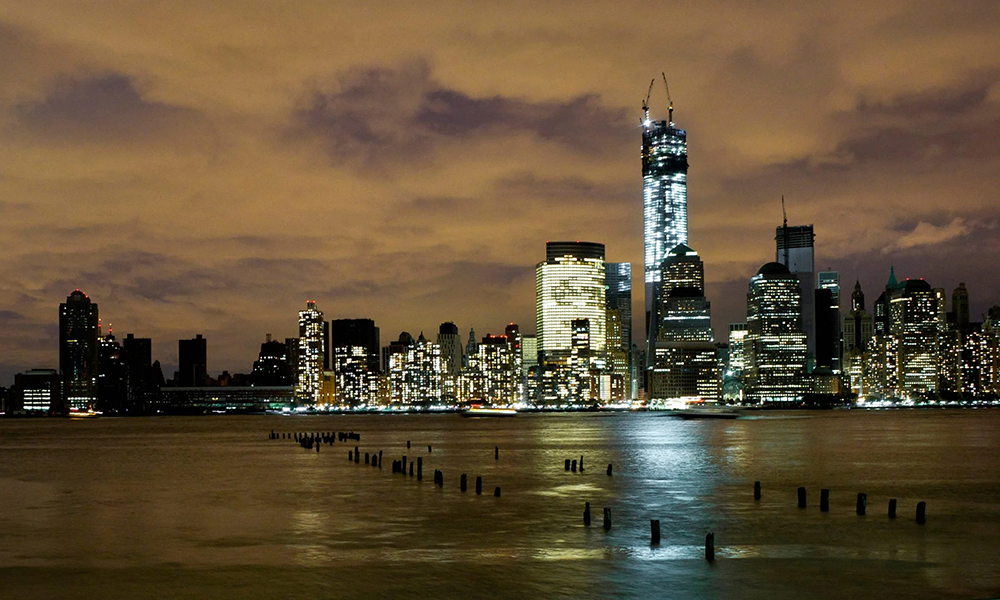 颶風桑迪過后,紐約市燈火闌珊。圖片來源:CULTURA RF/KAREN FOX—GETTY IMAGES
颶風桑迪過后,紐約市燈火闌珊。圖片來源:CULTURA RF/KAREN FOX—GETTY IMAGES消息流傳開來:紐約市正在下沉(以后將逐漸下沉)。眾所周知,全球的海平面已經上升,颶風桑迪過境后,哥譚市(紐約市的別稱)遭遇了佛羅里達州級別的大洪水。美國國家海洋和大氣管理局(National Oceanic and Atmospheric Administration)最近預測,到2050年,中度洪水的發生頻率預計將是現在的10倍以上。這預示著褐色泥水沖進地鐵這樣的視頻數量會是現在的10倍。但研究發現一個令人震驚的事實:著名的紐約天際線正以每次1毫米的速度墜入大海。
研究人員湯姆·帕森斯(Tom Parsons)、吳佩珍(Pei-Chin Wu,音譯)、孟威(Meng Wei,音譯)和史蒂文·德洪特(Steven D'Hondt)著手“計算紐約市所有建筑物的質量”,同時根據“它們對地球施加的壓力造成的沉降”進行建模,并展示從衛星數據中抓取的城市實際沉降的詳圖。他們發表在《地球的未來》(Earth’s Future journal)雜志上的研究結果顯示,紐約市每年已經下沉1毫米至2毫米,有些區域的下沉幅度更大。研究人員補充說,到2050年,海平面可能會上升200毫米到600毫米,對沿海城市和下沉城市(已經在下沉的城市)構成更大的威脅,其下沉速度是穩定地區的4倍。他們預計,隨著城市密度增加,世界上大多數城市都會下沉。
摩天大樓的建筑重量削弱了“大蘋果城”(紐約市的別稱)土壤的穩固能力。研究人員發現,這些建筑的平均質量約為155萬磅(703噸),因此所研究的建筑的總質量為1.68萬億磅(7.6億噸)。而在遠程工作時代,鑒于這些建筑越來越空曠,這有點諷刺。換句話說,紐約市可能會因這些毫無用處的建筑物而白白下沉。
就像一只邪惡的橡皮鴨
自新冠疫情爆發以來,越來越多的公司開始要求員工重返辦公室辦公。但他們基本上沒取得實質性進展,因為有些員工對重返辦公室的規定(與他們以前的靈活工作模式不同)視而不見。
最引人注目的是,華爾街的領軍人物、摩根大通首席執行官杰米?戴蒙(Jamie Dimon)要求員工重返辦公室辦公,結果卻遭到了員工們的抱怨。高盛集團(Goldman Sachs)首席執行官大衛?所羅門(David Solomon)去年表現得非常強勢,他命令所有員工都全職回辦公室上班。一年后,《財富》雜志的杰夫?科爾文(Geoff Colvin)報道稱,許多人都未重返辦公室辦公,出勤率在65%至69%之間,周五的出勤率幾乎為零。根據全國安全公司Kastle Systems的數據,即使今年2月辦公室出勤率達到疫情后的高點,也只保持在50.4%,這已成為遠程工作職位空缺的主要來源。面對這場艱苦卓絕的戰斗,一些首席執行官改變了路線,允許員工采用混合型工作模式。這些現實情況對摩天大樓構成挑戰,曾幾何時,員工集聚在此,完全受管理者的支配,如今這些摩天大樓卻成了讓曼哈頓墜入大海的無用之物。
雖然一些(巴塔哥尼亞的)野生動物仍然留在市中心和曼哈頓下城,但該地區仍難以恢復過去的樣子。據彭博社報道,紐約市的辦公室空置率今年達到了22.7%的歷史最低水平。紐約市演變成高樓林立的廢城,這一趨勢似乎不會很快停止,房地產公司戴德梁行(Cushman & Wakefield)最近預測,由于遠程辦公,到2030年,美國將有近3.3億平方英尺的辦公空間空置。
即使摩天大樓空置,它們仍是曼哈頓的基石。就像一只邪惡的橡皮鴨,這些摩天大樓可能會在最終的洪水中幸存下來,但作為壓力源,它們會加劇未來問題的嚴重性。但目前人們還無需杞人憂天(氣候變化造成焦慮)。上述研究的負責人、地球物理學家湯姆·帕森斯告訴《衛報》:“人們不必立馬就陷入恐慌狀態,但這一持續過程會增加洪水淹沒城市的風險”。話雖如此,研究人員指出,危險的雞尾酒正在醞釀中,因為“建筑和人為沉降、海平面上升和颶風強度不斷增加結合在一起,意味著沿海和河濱地區的問題正在加速惡化。”
即使由于通貨膨脹,一些城市居民搬到了更經濟實惠的地區,但總體而言,越來越多的人居住在城市地區。研究人員指出,聯合國的一項研究表明,到2050年,全球70%的人口將居住在城市。這意味著更多的人將受到環境變化的影響,同時也可能導致環境惡化。研究人員總結說:“據觀察,除南極洲外,各大洲的主要城市都在下沉。而且隨著人口增長,問題可能會惡化。”在摩天大樓不再像以前的辦公大樓那樣為我們服務的時代,也許是時候將它們夷為平地了,因為它們肯定對解決氣候變化問題無益。(財富中文網)
譯者:中慧言-王芳
消息流傳開來:紐約市正在下沉(以后將逐漸下沉)。眾所周知,全球的海平面已經上升,颶風桑迪過境后,哥譚市(紐約市的別稱)遭遇了佛羅里達州級別的大洪水。美國國家海洋和大氣管理局(National Oceanic and Atmospheric Administration)最近預測,到2050年,中度洪水的發生頻率預計將是現在的10倍以上。這預示著褐色泥水沖進地鐵這樣的視頻數量會是現在的10倍。但研究發現一個令人震驚的事實:著名的紐約天際線正以每次1毫米的速度墜入大海。
研究人員湯姆·帕森斯(Tom Parsons)、吳佩珍(Pei-Chin Wu,音譯)、孟威(Meng Wei,音譯)和史蒂文·德洪特(Steven D'Hondt)著手“計算紐約市所有建筑物的質量”,同時根據“它們對地球施加的壓力造成的沉降”進行建模,并展示從衛星數據中抓取的城市實際沉降的詳圖。他們發表在《地球的未來》(Earth’s Future journal)雜志上的研究結果顯示,紐約市每年已經下沉1毫米至2毫米,有些區域的下沉幅度更大。研究人員補充說,到2050年,海平面可能會上升200毫米到600毫米,對沿海城市和下沉城市(已經在下沉的城市)構成更大的威脅,其下沉速度是穩定地區的4倍。他們預計,隨著城市密度增加,世界上大多數城市都會下沉。
摩天大樓的建筑重量削弱了“大蘋果城”(紐約市的別稱)土壤的穩固能力。研究人員發現,這些建筑的平均質量約為155萬磅(703噸),因此所研究的建筑的總質量為1.68萬億磅(7.6億噸)。而在遠程工作時代,鑒于這些建筑越來越空曠,這有點諷刺。換句話說,紐約市可能會因這些毫無用處的建筑物而白白下沉。
就像一只邪惡的橡皮鴨
自新冠疫情爆發以來,越來越多的公司開始要求員工重返辦公室辦公。但他們基本上沒取得實質性進展,因為有些員工對重返辦公室的規定(與他們以前的靈活工作模式不同)視而不見。
最引人注目的是,華爾街的領軍人物、摩根大通首席執行官杰米?戴蒙(Jamie Dimon)要求員工重返辦公室辦公,結果卻遭到了員工們的抱怨。高盛集團(Goldman Sachs)首席執行官大衛?所羅門(David Solomon)去年表現得非常強勢,他命令所有員工都全職回辦公室上班。一年后,《財富》雜志的杰夫?科爾文(Geoff Colvin)報道稱,許多人都未重返辦公室辦公,出勤率在65%至69%之間,周五的出勤率幾乎為零。根據全國安全公司Kastle Systems的數據,即使今年2月辦公室出勤率達到疫情后的高點,也只保持在50.4%,這已成為遠程工作職位空缺的主要來源。面對這場艱苦卓絕的戰斗,一些首席執行官改變了路線,允許員工采用混合型工作模式。這些現實情況對摩天大樓構成挑戰,曾幾何時,員工集聚在此,完全受管理者的支配,如今這些摩天大樓卻成了讓曼哈頓墜入大海的無用之物。
雖然一些(巴塔哥尼亞的)野生動物仍然留在市中心和曼哈頓下城,但該地區仍難以恢復過去的樣子。據彭博社報道,紐約市的辦公室空置率今年達到了22.7%的歷史最低水平。紐約市演變成高樓林立的廢城,這一趨勢似乎不會很快停止,房地產公司戴德梁行(Cushman & Wakefield)最近預測,由于遠程辦公,到2030年,美國將有近3.3億平方英尺的辦公空間空置。
即使摩天大樓空置,它們仍是曼哈頓的基石。就像一只邪惡的橡皮鴨,這些摩天大樓可能會在最終的洪水中幸存下來,但作為壓力源,它們會加劇未來問題的嚴重性。但目前人們還無需杞人憂天(氣候變化造成焦慮)。上述研究的負責人、地球物理學家湯姆·帕森斯告訴《衛報》:“人們不必立馬就陷入恐慌狀態,但這一持續過程會增加洪水淹沒城市的風險”。話雖如此,研究人員指出,危險的雞尾酒正在醞釀中,因為“建筑和人為沉降、海平面上升和颶風強度不斷增加結合在一起,意味著沿海和河濱地區的問題正在加速惡化。”
即使由于通貨膨脹,一些城市居民搬到了更經濟實惠的地區,但總體而言,越來越多的人居住在城市地區。研究人員指出,聯合國的一項研究表明,到2050年,全球70%的人口將居住在城市。這意味著更多的人將受到環境變化的影響,同時也可能導致環境惡化。研究人員總結說:“據觀察,除南極洲外,各大洲的主要城市都在下沉。而且隨著人口增長,問題可能會惡化。”在摩天大樓不再像以前的辦公大樓那樣為我們服務的時代,也許是時候將它們夷為平地了,因為它們肯定對解決氣候變化問題無益。(財富中文網)
譯者:中慧言-王芳
Start spreading the news, New York’s (gradually) sinking today. It’s well established that sea levels are already rising across the globe, and New York City’s brush with Hurricane Sandy brought a Florida-level flood to Gotham. The National Oceanic and Atmospheric Administration recently projected that in 2050 moderate flooding is projected to occur more than 10 times as frequently as it does now. Cue 10 times as many videos of brown water rushing into the subways. But stunning research finds that the famous New York skyline is falling into the sea, one millimeter at a time.
Researchers Tom Parsons, Pei-Chin Wu, Meng “Matt” Wei and Steven D’Hondt set out to “calculate the mass of all buildings in New York City” while modeling the “subsidence caused by the pressure they exert on the Earth” and to show detailed images of the city literally sinking, scraped from satellite data. Their findings, published by the Earth’s Future journal, showed the city is already sinking 1mm to 2mm a year, and in some places more than that. The researchers add that the sea levels will likely rise by 200mm to 600mm by 2050, posing a greater threat to coastal cities and subsiding cities (cities that are already sinking), at a rate of four times higher than stable regions. Most cities around the world will sink as urban areas become denser, they projected.
The tectonic weight of the skyscrapers weakens the soil of the bobbing Big Apple, as researchers find that the average building mass is around 1.55 million pounds, making the collective mass of the buildings studied 1.68 trillion pounds. And in the age of remote work, it’s a bit ironic, given that these structures are increasingly empty. In other words, New York could be sinking for nothing.
Like an evil rubber ducky
Since the pandemic began three years ago, more companies have been ushering employees back to their offices. But they largely haven’t had great success with this, as some turn a blind eye to mandates that don’t adhere to their previous flexible ways of working.
Most prominently, JPMorgan CEO Jamie Dimon, a dominant figure on Wall Street, called workers back, only to be met with a surge of complaints from employees. Goldman Sachs CEO David Solomon emerged as strongly team office last year, ordering everyone to come in full-time. A year later, Fortune’s Geoff Colvin reported that many just haven’t shown up, and that attendance hovers at 65% to 69%, and almost zero on Fridays. Even when office attendance hit a post-pandemic high in February of this year, it remained only at 50.4%, according to data from nationwide security company Kastle Systems, which has emerged as the leading source on remote work vacancies. Facing an uphill battle, some CEOs have reversed course and allowed for hybrid work. It all puts into challenge the purposes of skyscrapers that were used to hoard employees under managers’ thumbs and are now boondoggles quite literally pressing Manhattan down into the sea.
While some (Patagonia-vested) wildlife remains downtown and in Lower Manhattan, the area still isn’t what it used to be, as Bloomberg reports that office vacancies in NYC reached a record low of 22.7% this year. The skylined ghost town doesn’t seem to be stopping anytime soon, as real estate firm Cushman & Wakefield recently projected that almost 330 million square feet of US office spaces could become vacant by 2030 as a result of remote work.
Even if our skyscrapers stand unused, they’re still letting themselves be known to the bedrock of Manhattan. Like an evil rubber ducky, these skyscrapers might survive eventual flooding, but they’re a stressor that heightens the severity of issues in the future. But there’s no need for paralyzing climate anxiety just yet, “It’s not something to panic about immediately but there’s this ongoing process that increases the risk of inundation from flooding,” Tom Parsons, a leader of said research and geophysicist told The Guardian. That being said, researchers note that there’s a dangerous cocktail brewing, as the mix “of tectonic and anthropogenic subsidence, sea level rise, and increasing hurricane intensity imply an accelerating problem along coastal and riverfront areas.”
Even with some city-dwellers moving out to cheaper areas because of inflation, people are in general increasingly living in urban areas. Researchers point to a study from the United Nations to show that 70% of the worlds’ population will live in cities by 2050. This all means that more will be subjected to this environmental change and also likely lead to worsening it. “Major cities on every continent except Antarctica are observed to be subsiding and the issue may be worsened as populations grow,” conclude researchers. In a time where our skyscrapers don’t serve us as much as the office buildings they used to stand in as, it might be time to do away with them altogether, as they’re certainly not helping the issue of climate change.






